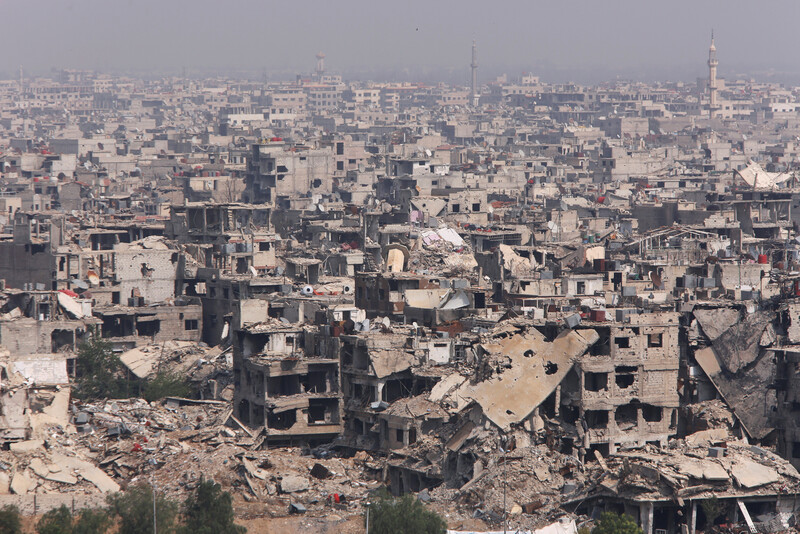Rights and Accountability 23 May 2018

Yarmouk refugee camp photographed on 28 April.
ReutersSyria’s Yarmouk camp “lies today in ruins with hardly a single building that has not been destroyed or damaged,” the United Nations stated this week.
The Syrian military announced in recent days that it had taken full control of Yarmouk camp and surrounding areas on Monday following a month-long operation aimed at routing armed insurgents from southern Damascus.
Fighters with the Islamic State group evacuated the camp by bus and were said to have retreated to the north of the country.
The entirety of the Syrian capital and it suburbs were once again under full government control for the first time since the 2011 popular protests and subsequent civil war.
While the Syrian government declared victory, Yarmouk camp, formerly the heart of the country’s Palestinian refugee community, has been reduced to rubble.
“Yarmouk was once the thriving home of 160,000 Palestinians. Today it lies in ruins, with hardly a house untouched by the conflict,” Chris Gunness, spokesperson for UNRWA, the UN agency for Palestine refugees, told Agence France Presse.
“The public health system, water, electricity, basic services for life are severely damaged. The debris of this pitiless conflict is everywhere,” he said.
“In that environment, it is hard to see how people can go back.”
Reduced to rubble
AFP’s correspondent reported that in Yarmouk, an arena of fighting since late 2012, “buildings had been reduced to mound after mound of smashed concrete and rubble.”
Much of that destruction was incurred over the past few weeks as the camp was repeatedly hit in air strikes and by surface-to-air missiles.
Islamic State fighters set fire to their positions before retreating from the camp.
Some 100 to 200 civilians, including elderly and sick persons unable to relocate, are still believed to be living in the devastated camp, according to UNRWA.Civilians killed
Around 30 Palestinian residents were killed over the past month, according to the Action Group for Palestinians of Syria.
On Saturday five members of a single Palestinian refugee family were reported killed in bombing in the camp. Three members of a Syrian family were also reported killed.
On Friday, 85-year-old Thahabiyya Fahd Abu Rashed, originally from Haifa in Palestine, was killed by bombing in the camp.
Hundreds of fighters among both the armed insurgents and pro-government forces were killed during the month of fierce battle over the camp, the Syrian Observatory for Human Rights told media.
Residents began to flee Yarmouk in the thousands in late 2012 after rebel forces infiltrated the camp and its central mosque was hit in government airstrikes.Since then, electricity and water supplies to the camp have been cut and a complete siege was imposed by government forces and allied groups in July 2013.
Dozens in the camp starved to death that following winter, and many more were killed during clashes and ongoing shelling and strikes on Yarmouk.
In April 2015, the camp was infiltrated by fighters with the Islamic State group and various armed factions vied for control of this southern gateway to Syria’s capital.
UNRWA has been unable to deliver humanitarian aid directly to Yarmouk since it was seized by Islamic State.
Talks to rebuild underway
Witnesses reported that Syrian government forces looted Yarmouk’s Palestine hospital, and prevented Palestine Red Crescent Society crews from entering the building earlier this week.
An official with the Palestine Liberation Organization told media that discussions with UNRWA concerning the rebuilding of Yarmouk were underway.
“The next step after liberation is combing the area, removing rubble, and assessing the damage to rebuild and bring infrastructure back so civilians can return,” Anwar Abdel-Hadi told AFP.
The final destruction and depopulation of Yarmouk – long considered the capital of the Palestinian refugee diaspora – coincided with the commemoration of the 70th anniversary of the Nakba or catastrophe.
Some 750,000 Palestinians ended up as refugees following the ethnic cleansing of Palestine before, during and after the declaration of the state of Israel in 1948.
Israel has refused to let Palestinians exercise their right of return to their lands and properties because they are not Jews.
Palestinians living in Yarmouk as well as other refugee camps in Syria and beyond have been subjected to one displacement after another during seven decades of exile and statelessness.
Nahr al-Bared in the north of Lebanon was left destroyed after a summer-long battle between that country’s army and Salafi militants who had infiltrated the refugee camp in 2007.
More than 10 years later, that camp has still not been fully rebuilt and many of its residents remain displaced.





